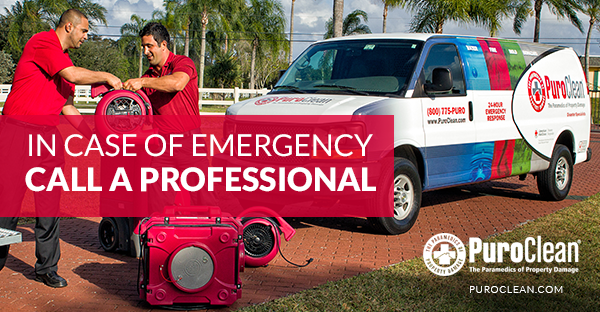“April showers” are sometimes much more than just a bit of rain. Spring weather can include a wide range of weather activity – including serious storms with severe winds that can cause serious structure damage and heavy rainfall that can cause over-the-ground flooding, or even flooding from streams and rivers.
The storm season is upon us! If you experience damage of any size, these tips may help you get your home back in order more quickly. Keep this advice handy for quick reference.
INSURANCE
- Call your agent as soon as possible.
- Take photographs of the damage.
GETTING HELP FOR YOUR HOME
When checking your home or business for damages, watch out for fallen power lines, standing water that may be electrically charged, and wild animals driven into the open.
-
- Plumbing: Check pipes inside and outside your home (i.e. irrigation systems). Within your home, there are usually shut-off valves in specific areas near toilets and under sinks. If necessary, locate the master valve and shut off all water to your home. If sewage is backing up in the shower or under the toilet, it probably means your main sewer line is clogged or broken. Don’t make the problem worse by using other sinks or toilets. Call a professional for assistance.
-
- Roofing: Check your roof for missing shingles. Even if only a few shingles are lost, do not risk life and limb by going onto your roof. Call a professional roofer, contractor or handyman. They have the skills, tools and equipment to do the job safely and properly. Have them do a temporary “fix” to stop rain coming in, until a permanent solution can be arranged.
-
- Electrical: Most damage to electrical systems comes from water. Appliances exposed to water should be disconnected from their power source and serviced before being used. Check for frayed wires and watch for sparks. If you have structural damage or see exposed wires, call an electrician. Keep the power off – there is the possibility of electrocution if you turn the power on yourself. Exterior breaker boxes are typically rain-tight but may not withstand a major storm – if you suspect water has infiltrated the box, call an electrician before turning on the power. Avoid metal fences – they may carry a charge from fallen or dangling utility wires. If a limb or tree has fallen on a power line near your house, turn off the power and call the utility company. If the limb touches your property, it becomes your responsibility. Call an electrician. Do not attempt to cut or clear fallen trees that are around power lines.
FLOODING
For flooding problems, your best plan is to call a professional restoration company. If you decide to do-it-yourself, here are some tips that may help: because of contaminants (such as sewage, oil, pesticides, etc.), take precautions and wear boots, gloves, eye protection, and a respirator; minimize the damage by removing standing water (pump or squeegee the standing water and use a vacuum only if it’s a true wet-dry vacuum); remove everything absorbent that has been contaminated by flood water (carpeting, carpet padding, furniture, drapes, etc.); use air movers and dehumidifiers to dry out the area; throw away all medicines, cosmetics, and foods – even canned goods – if they have been submerged in floodwaters; check for hidden moisture behind wallboards, and take out damaged portions to avoid mold; and clean floors and cabinets by washing them with detergent, then disinfect with a disinfectant from the grocery or hardware store. Remember, keep a photographic (or video) inventory of anything you must throw out.
FIRING UP THE CHAINSAW
Don’t! Felling a broken tree or clearing away a large downed tree can be dangerous. A professional should be contacted.
AUTOMOBILES
Automobiles can easily be damaged by floodwaters, tree limbs, or falling debris. If an automobile is damaged: notify your insurance agent; cover broken windows if the car appears salvageable; and list valuables in your car that have been lost or damaged.
SCAM – ALERT
Unfortunately, storms and natural disasters bring out those who take advantage of the situation. But by following a few practical guidelines, you can help protect yourself from additional loss: try to work with local or known contractors (verify with the Yellow Pages); don’t pay for work until it is finished and you are satisfied (if a reasonable down payment is required, get a written contract detailing all the work to be performed); pay with a check or a credit card. Beware of a contractor who tries to pressure you. If an offer is only good “now or never,” find someone else.
Obtain written estimates for all proposed work that include proposed scopes and prices. Also, beware of charity scams that might use a storm to make their pleas for donations more plausible; only give to organizations you know and recognize. Regardless of the circumstances – damage from storms or floods, or damage from fire, smoke or even mold, call your local PuroClean office, the Paramedics of Property Damage™. These professionals are standing by to mitigate the loss and prevent further damage, and to provide restoration services to return the property to a preloss condition as quickly as possible. All PuroClean offices have professional, well-trained technicians who provide the latest state-of-the-science services to all property damaged from water, fire/smoke, mold, and other disasters.




 PuroClean of Alexandria
PuroClean of Alexandria